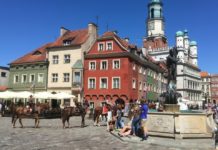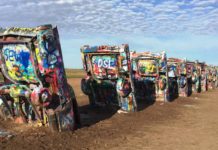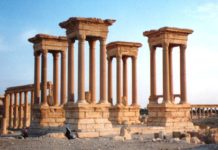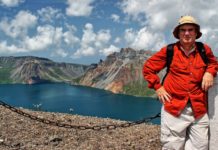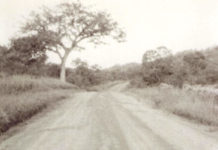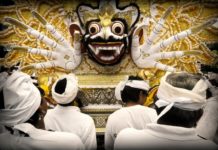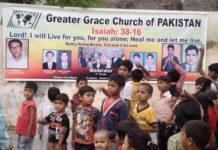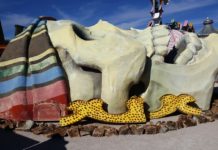CHAPTER 17
Have mercy on the criminal who is running from the law – “Have Mercy On The Criminal” by Elton John (1973)
For two nights, we stayed with Rolf and Marta before moving into the youth hostel in central Dar es Salaam. Ted and I were still trying to comprehend the shocking news that our friends Bob and Gordon were probably dead.
“I can see Gordon mouthing off to the wrong guy at the wrong time, and one of those fuckers killing him,” I said.
“Yeah, and since Bob was with him, they killed him too,” Ted replied.
“You don’t think they were spies, do you?” I asked.
“That thought crossed my mind,” Ted said, “but, nah, no way. I mean, who would they be spying for? They weren’t Israeli, so who? The CIA? I doubt it.”
“I’m just thinking out loud,” I responded. “We didn’t really know anything about them, and if they were undercover, wouldn’t they have acted freaky like Bob and Gordon? Wouldn’t they come into Uganda from some remote place like Juba and try to blend in by hooking up with tourists like us?”
“Maybe, but I don’t think so,” Ted answered. “They were probably two crazy guys who didn’t realize how dangerous Uganda was and got themselves killed at Makindye.”
“It could easily have been us, you know?” I added.
“Yeah, I know.” Ted responded with sadness in his eyes.
Dar es Salaam was a beautiful city. Situated on the Indian Ocean, it looked like a fascinating place that might be worth exploring. We contemplated making a trip to Madagascar, the legendary island off the southeast coast of Africa, but were getting low on funds. The next leg of our journey would take us to Lusaka, the capital of Zambia. Ted and I went to the embassy to get our visas, and I made a trip to American Express to see if I had any mail.
My parents had written again, and they were still nervous about my standing with the Selective Service. Luckily, I had not received a reply to my request for conscientious objector status. I had no hope for a decision in my favor, but I was always relieved when I didn’t hear from them.
After the warnings Rolf and Marta had given us about crossing the border, I felt less confident about reaching South Africa. I was having frequent bouts of stomach cramps and severe diarrhea and was sure that drinking water from the Nile River was the cause.
Settling down for a while was something I craved. Unfortunately, we were a thousand miles from Lusaka. Although the roads in Tanzania were in fine condition, the hitchhiking was terrible. Few cars stopped for us, and the weather was hot as hell. Every day, we’d optimistically stick our thumbs out. At night, we would set up our tent, cook small meals on the gas stove, catch some sleep, and get back on the road first thing in the morning.
About halfway to Lusaka, we were making little progress and seeing practically no cars. I asked some locals if there was another way to get through the rest of Tanzania, and one of them told us about a bus that went to the Zambian border. We went to the station, bought two tickets, and were grateful not to spend another day standing on the side of the road in the stifling heat.
“I was relieved that we got out before the hostile mob turned its fury on me.”
While we were waiting for the midnight bus, Ted and I milled around the enormous open-air bus depot. The boarding area was disorganized and poorly lit. Passengers were scrambling to board buses heading in every direction. My main concern was that we didn’t accidentally get on the wrong one.
Suddenly, from behind me, I heard a commotion. I turned around and noticed that a bunch of people were shouting and pointing at me.
“Hey! That boy took your passport!” one guy yelled.
I reached into my back pocket. My passport was gone! I frantically scanned the crowd to spot who could have taken it, but I didn’t see anyone suspicious. The thought of losing it freaked me out. It couldn’t have been a worse place for it to happen because the nearest embassy was back in Dar es Salaam, hundreds of miles away.
Another man pointed toward a child and announced, “That boy is a pickpocket! He stole your passport!”
Several men quickly gathered around the boy, who couldn’t have been more than 12 years old. Reprimanding him in Swahili, they slapped, kicked, and punched him mercilessly as he fell to the ground. I pushed my way through the crowd to get a closer view. The terrified child was cowering on the ground with blood pouring out of his nose.
“Hey!” I screamed. “Stop that! Stop hitting him!”
One guy glared at me icily and snarled, “We know this boy. He is a thief, and he stole your passport!”
As the boy sobbed and trembled, he cruelly reached out and slapped him straight across the face with all of his might. The child howled in pain.
I positioned myself between the man and the boy and shoved him back so he couldn’t strike again. Before he had a chance to react, two policemen forced their way through the angry mob. One of the officers shouted at him in Swahili, and a loud, animated argument followed.
The policeman turned to me and declared, “They are saying that the boy is a thief, and has stolen your passport.”
“I didn’t see him steal my passport,” I explained, “but even if he did, that’s no reason to beat him!”
“Don’t tell us how to deal with a thief,” the man who had been slapping the boy sneered.” We know what to do with him!”
The policeman grabbed the blood-covered boy by the arm, shot me a nasty look, and growled, “Follow me!”
The crowd jeered and laughed as Ted and I followed the officers. They were obviously upset that we had interfered with their method of dealing with a criminal. Honestly, I was relieved that we got out before the hostile mob turned its fury on me.
The police station was a short walk from the bus depot. When we arrived, we were directed to sit on a wooden bench. The two policemen pulled the boy into an adjacent room out of our line of sight. Soon, I heard the sound of the policemen’s fists punching his body repeatedly and then the sound of open hands slapping his face. The beating was brutal; the child screamed and pleaded for them to stop.
I jumped up and approached the policeman who was sitting behind his desk ignoring the event.
“Hey! That’s not right!” I shouted.
Without a word, he looked up and calmly motioned for me to sit back down.
“I don’t even know that he took my passport!” I asserted. “I can get another one! It’s not that big a deal. Just please stop hurting him!”
The officer stared back at me with the most curious look on his face, as if he could not understand why I wouldn’t want this kid properly punished.
The beating continued. It was followed by total silence.
I wondered, “Had they had killed him?”
One policeman casually walked out of the room, shot me an evil glare, and disappeared out the front door of the station.
Ten minutes later, he returned and tossed my passport on the counter.
“Here is your passport,” he said with derision. “He told us where it was hidden. You should not have interfered. We do not need advice from you or lessons about punishment. We know about justice here in Africa.”
He looked disgusted as he turned and walked away. I grabbed my passport, and Ted and I bolted to the terminal as fast as we could. Luckily, we were able to get there in time for the bus.
After the incident, my dilapidated passport was in even worse condition. The cover and pages were bent and wet, and I needed to replace it at the next available opportunity. On top of that, the British five-pound note I had secretly tucked inside the back cover in case of an emergency was missing.
“Money was now officially a concern, and we needed every penny for the final push to South Africa.”
The bus dropped us off at the edge of the Great Rift Valley in a town called Mbeya, about 50 miles from the Zambian border. We camped there for the night, and by noon the next day, we managed to get a ride the rest of the way.
Once we crossed into Zambia, we were still hundreds of miles from Lusaka, and our losing streak resumed. Once again, there were no cars on the road. I kept seeing groups of Chinese workers who I had been told were brought to the country to build a network of modern highways. I wondered who would be using all of these new roads.
For the next two days, we saw only one car – a Land Rover that flew by us at high speed as we stood there sticking out our pleading thumbs. To say it was disheartening would be an understatement. Soon we ran out of food and water. Three days later, we scraped together enough rides to drag our starving and filthy asses into Lusaka.
With some help from the locals, we found a cheap hotel, but after one night Ted and I moved into the even cheaper youth hostel. Money was now officially a concern, and we needed every penny for the final push to South Africa. Between the two of us, we counted about four hundred dollars.
“Somehow, they managed to escape the locked room and get out of the country alive.”
A pile of mail was waiting for me at American Express. Unfortunately, one of the letters was from the Selective Service. My request for a conscientious objector deferment had been summarily rejected, thereby shooting down my last remaining hope of avoiding the draft. They also stated that they didn’t appreciate my smart aleck remarks from Africa. For the third time, they ordered me to report to a military installation in San Francisco, Germany, or Guam.
When I read the rejection letter, I let out a long sigh. I was so fucking tired of the constant back and forth with them. The stress over what to do next was bearing down on me. My stomach was getting worse by the day, and I was exhausted from the hard traveling I’d done over the past year. All I wanted was to get to South Africa, see a doctor, and figure out what the hell was wrong with me.
The stack of mail contained even more bad news. A tattered envelope had been forwarded several times before finally reaching us in Lusaka. Inside was a letter from Tanya and Gail, the two American girls we had met in Cairo, detailing a harrowing night they had spent with two guys that they met in Beirut, Lebanon. Gail had been drugged, and when she woke up, she found Tanya naked and passed out on the floor. She had been raped. Somehow, they managed to escape the locked room and get out of the country alive.
My first thought was, “I wonder if the guys were local blackjack dealers.”
After reading my depressing mail, I went to the American Embassy to inquire about getting my passport replaced.
The lady took one look at it and commented, “Looks like some pretty hard miles on this passport.”
“Yeah, if it could talk, it would have a lot to tell you.” I replied.
What a relief it was to learn that there wouldn’t be a problem getting a new passport. I gave them the photos I’d had taken in Cairo when my hair was down to the middle of my back, and the following day I picked up my new passport. After paying the fifteen-dollar fee, I left. Nobody at the embassy had said a single word about my draft status.
“We ate like two starving men returning to civilization after weeks in the wilderness.”
At the embassy, I was told that I would not need a visa to get into Rhodesia. Since it was an outlaw nation, no embassies or bureaucratic structure were in place. When you arrived at the border, they either let you in or they didn’t.
During lunch one afternoon, I met the editor of a local newspaper who was intrigued by my travels in Africa. He told me that he might be willing to hire me, depending on how good my travel tales were. When I mentioned what happened to us in Uganda, he offered to pay for the story and instructed me to write it up as soon as possible. I dashed it out on a typewriter in his office. The editor read it and immediately offered me twenty bucks. It was easy money but certainly not enough to justify sticking around Zambia.
Ted and I decided to leave for the city of Livingstone and Victoria Falls. After making it a few miles out of Lusaka, we hit another stretch of extremely difficult hitchhiking and, once again, found ourselves running low on food and water. For days, we walked along an endless stretch of freshly paved asphalt highway surrounded by dense jungle without seeing a single vehicle.
We virtually crawled into Livingstone. Ted and I staggered into the first restaurant we could find. The establishment catered to tourists who came to visit Victoria Falls. We ate like two starving men returning to civilization after weeks in the wilderness.
On the edge of Livingstone, we found a campsite. It was a nice soft grassy spot, and I got some of the best sleep that I had in days. I could hear the continuous, low roar of the Zambezi River pouring over immense cliffs to form one of the largest waterfalls in the world.
The next day, we hiked down to see the sight for ourselves and were treated to a stunning view. Looking at Victoria Falls gave me the same feeling that I had experienced when I saw the Pyramids and Mt. Kilimanjaro for the first time. Because I’d seen them so many times in pictures, they had seemed familiar to me, but they were much more impressive in person. Hearing and feeling the thundering power of the water and having the spray hit me in the face was absolutely exhilarating.
Afterwards, I walked alone around the park and encountered an array of birds and other small animals. It was the perfect setting to reflect on where I had been and how much I had been through before arriving at this spot. It also made me realize how close I was to reaching my goal of making it to South Africa.


